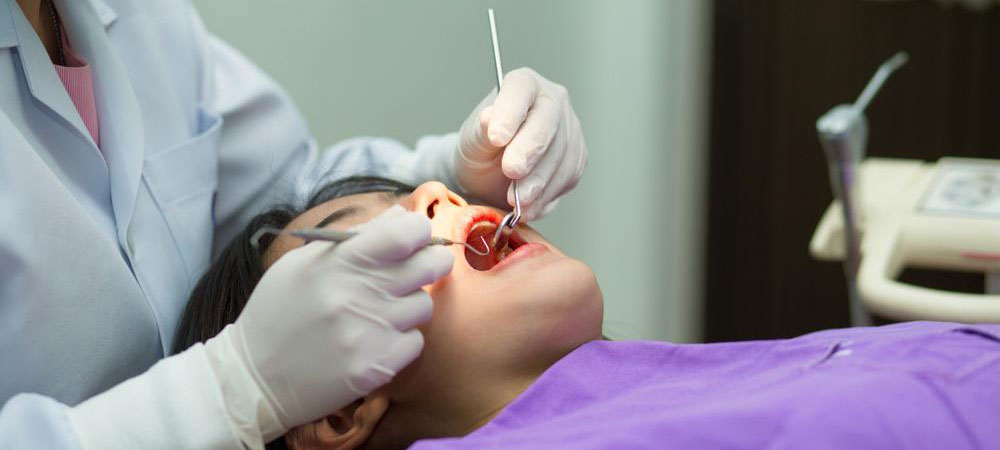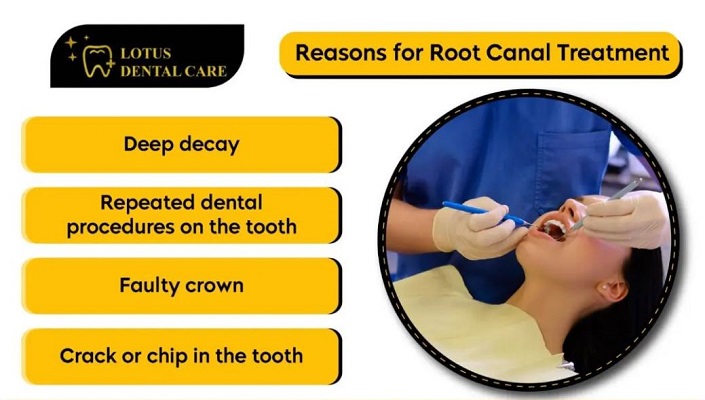
Best Dentist for Advanced Root Canal Treatment in Vashi, Navi Mumbai
If you're experiencing a toothache or dental infection, getting root canal treatment may be the solution to alleviate your pain and keep your natural tooth.
Luckily, Lotus Dental Care Clinic in Navi Mumbai offers reliable and top-notch root canal treatment in a safe and cozy atmosphere. With their knowledge and attention, you can start your journey towards a healthier and painless smile.
Why do need Advanced Root Canal Treatment ?

It may be more than just an inconvenience if you experience sharp tooth pain or sensitivity when you eat an ice cream or drink something hot. These indicators of an infected pulp in the tooth, along with others, may exist. The dental procedure called a root canal is used to treat tooth pulp infection.
What is Root Canal Treatment ?
A Root Canal is used to treat an infected or abscessed tooth to ease the pain. The root canal operation involves the removal of the inflamed pulp. A filling is used to seal the hole after the interior surfaces of the tooth have been cleaned and disinfected.
Dr. Sonal Agrawal of the Lotus Dental clinic is a skilled dentist who has a lot of experience with root canal treatment. The clinic has the best quality pieces of equipment for the treatment.
Procedure of Root Canal :

Post Procedure :
When the anesthetic loses its effect, your teeth and gums could feel pain. Dr. Sonal Agrawal will advise you to take over-the-counter painkillers to ease these symptoms. If the discomfort lasts for more than 2 or 3 days or becomes severe, contact your dentist. The day after the surgery, you will be able to return to your regular schedule. Till the injured tooth is properly filled or has a crown put on top, refrain from chewing with it. To ensure that no infection is present, X-rays will be taken. She will also put a permanent filling in lieu of the temporary one.
Cost of Root Canal Treatment in Vashi
According to the complexity of the problem and the tooth involved, the cost will vary. Lotus Dental Care offers affordable options. Contact us today to speak with a dentist who is an expert in this field. If you have questions about the cost of root canal treatment, please do not hesitate to call us.
Is A root canal painful?
Root canal treatment is often perceived as painful. Still, with modern techniques and anesthesia, most patients experience minimal discomfort during the procedure. The dentist will numb the area around the affected tooth to ensure the patient's comfort, and sedation may be used if necessary.
After undergoing the procedure, patients may experience some discomfort or sensitivity for a brief period. However, this can be easily managed using over-the-counter pain relievers. To ensure that proper healing takes place and to minimize any discomfort, patients must follow the aftercare instructions provided by their dentist.
To sum up, a root canal treatment may cause slight discomfort. However, with appropriate anesthesia and proper aftercare, it should not be a painful procedure.
Discuss Anesthesia Options with Your Dentist.
When preparing for a root canal treatment in Navi Mumbai, you must talk to your dentist about the available anesthesia options. Usually, local anesthesia is used to numb the area around the affected tooth.
However, if you feel anxious or fearful about the procedure, your dentist may recommend additional sedation options like nitrous oxide or oral sedatives.
Make sure you communicate your concerns to your dentist so that they can assist you in feeling as comfortable as possible during the procedure.
How long will root canal last?
After a root canal treatment, a tooth can typically last for 10 to 15 years. But if a dental crown is added to the treatment, the tooth's lifespan can significantly increase.
Can I brush my teeth after a root canal?
Yes! It is highly unlikely that a dentist will advise you not to brush your teeth after a dental procedure. Once the effects of the anesthesia have worn off entirely, you are free to resume brushing your teeth as usual.
How to Care for Your Teeth After Root Canal Treatment
After a root canal treatment, taking proper care of your teeth is essential to promote healing and prevent further damage or infection. Here are some tips on how to care for your teeth after a root canal treatment:
- Avoid chewing on the treated tooth: To ensure proper healing and prevent any harm, please avoid using the treated tooth to bite or chew on hard or crunchy foods for a few days after the procedure.
- Practice good oral hygiene: To keep your teeth healthy and avoid tooth decay or infection, brush your teeth twice daily using fluoride toothpaste and floss daily to remove any plaque or food particles.
- Use a soft-bristled toothbrush: For a more comfortable experience, use a toothbrush with soft bristles to prevent discomfort in the treated tooth or gums. It's important to be gentle when brushing around the treated area.
- Avoid smoking and drinking alcohol: Smoking and alcohol can delay healing and increase the risk of infection. Avoid these habits for a few days after the procedure.
- Take over-the-counter pain relief: You may feel discomfort after the procedure. To help alleviate the pain, you can take over-the-counter pain relief medications such as ibuprofen or acetaminophen.
- Attend follow-up appointments: Make sure to attend all appointments with your dentist as scheduled. Doing so will help them monitor the healing process closely and address any concerns promptly.
- Consider a dental crown: Your dentist may advise getting a dental crown to safeguard and reinforce a weakened tooth that has undergone a root canal procedure.
To ensure your treated tooth heals properly and avoid any further damage or infection, it's important to follow these tips. If you have any concerns or questions, it's crucial to consult with your dental practitioner.
Avoid Certain Foods and Beverages.
After a root canal treatment, avoiding certain foods and beverages is essential to promote healing and prevent further damage or infection. Here are some foods and drinks to avoid:
- Hard and crunchy foods
- Sticky and chewy foods
- Spicy and acidic foods
- Carbonated and sugary beverages
- Alcohol and tobacco
- Hot beverages
- Ice or extremely cold foods
Avoiding these foods and beverages can promote healing and prevent further damage or infection to your treated tooth. Maintaining good oral hygiene by brushing twice daily and flossing daily is essential to avoid future tooth decay or disease.
Is A root canal permanent?
Choosing a crown and root canal procedure is superior to extraction and bridge as it provides a longer-lasting solution. While root canals may not be permanent, they effectively address the issue for several years, allowing you to retain your natural teeth for an extended period.
How long does 1 root canal take?
The number of appointments required for root canal therapy is determined by the severity of the infection in your tooth. The procedure typically lasts between 30 to 60 minutes. Still, in the case of larger teeth with multiple roots, it may take up to 90 minutes to complete.
Can I eat after root canal?
It is possible to eat after a root canal treatment. Still, you should avoid specific foods during the first few days after the procedure. Your mouth and the treated tooth will be sensitive. They may feel sore for a while, so it is advisable to consume soft foods and steer clear of hard or crunchy foods that may cause discomfort or harm to the treated tooth.
Here are some soft foods that you can eat after a root canal treatment:
- Soup
- Mashed potatoes
- Scrambled eggs
- Yogurt
- Smoothies
- Soft fruits like bananas or peaches
- Cooked vegetables like carrots or green beans
To prevent sensitivity or pain in the treated tooth, it's essential to steer clear of hot or cold foods and drinks. It's also best to avoid alcohol and tobacco for a few days following the procedure, as they can hinder the healing process and increase the chance of infection.
Maintaining good oral hygiene by brushing your teeth twice a day and flossing daily to avoid tooth decay or infection is essential.
The Benefits of Root Canal Treatment in Navi Mumbai
Root canal treatment is a common dental procedure for treating infected or damaged teeth. Here are some of the benefits of root canal treatment:
- Pain relief
- Save the natural tooth
- Prevent further infection
- Improved oral health
- Restores tooth function
- Cost-effective
If you have a damaged or infected tooth, root canal treatment can be a safe and effective solution to ease pain, prevent infection, and restore the function and appearance of your natural tooth.
Communicate with Your Dentist.
One of the most important things you can do to prepare for your root canal treatment in Navi Mumbai is to communicate openly and honestly with your dentist.
Let me know about any concerns or fears you may have and any medications or health conditions that could affect the procedure. We can work with you to develop a personalized treatment plan that meets your needs and ensures a comfortable, successful outcome.
Don't be afraid to ask questions or voice any concerns – we are there to help you every step of the way.